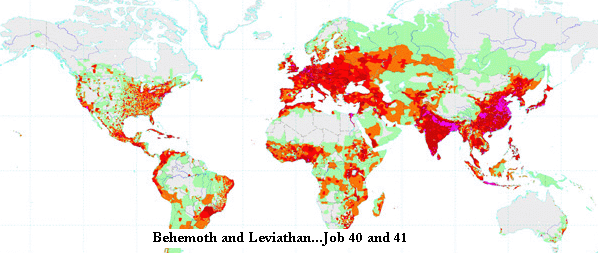
AMERICAN EMPIRE
By Ivo Daalder and James M. Lindsay
he 100,000 American troops patrolling Baghdad and other Iraqi cities retain
"absolute authority within Iraq," declared their commander, Lt. Gen.
David McKiernan. At the same time, AMERICAN FORCES ARE BEING DEPLOYED IN A GRAND
CRESCENT SURROUNDING THE GREATER MIDDLE EAST, FROM THE BALKANS SOUTHEST TO DIJIBOUTI,
EAST THROUGH THE PERSIAND GULF REGION INTO PAKISTAN AND AFGHANISTAN, AND NORTH
INTO UZBEKISTAN AND KRYGYZTAN.

Little wonder that commentators at home and abroad continually speak of a new American empire. In the last six months alone, as debate on Iraq peaked, the phrase "American empire" was mentioned nearly 1,000 times in news stories, while bookstores have been quickly filling their shelves with freshly minted tomes on the subject.
On one side are those who urge Washington to reject the imperial temptation. These voices can be found on both the far right and the far left. Pat Buchanan, author of "Republic or Empire?" and editor of the new American Conservative Weekly, is concerned that the "conservative movement has been hijacked and turned into a globalist, interventionist, open borders ideology," which, he says, is a far cry from the conservative movement he grew up with. Noam Chomsky, whose "Hegemony or Survival: America's Quest for Global Domination" is scheduled for publication in the fall, warns that the BUSH ADMINISTRATION'S "FORTHRIGHT DECLARATION THAT IT INTENDS TO RULE THE WORLD BY FORCE"amounts to fanaticism.
On the other side are the so-called neoconservatives, who sayTHE UNITED STATES HAS THE OPPORTUNITY TO REMAKE THE WORLD IN ITS OWN IMAGE. The syndicated columnist Charles Krauthammer, for example, says American foreign policy should seek to transform the unipolar moment of the 1990's into "the unipolar era." William Kristol, the editor of the conservative Weekly Standard, told Fox News recently: "WE NEED TO ERR ON THE SIDE OF BEING STRONG. And if people want to say we're an imperial power, fine."
Some commentators go even further, arguing that the problem is not too much American imperialism but too little. In their eyes, Afghanistan taught that failed and failing states threaten American security by providing safe havens for terrorists, drug traffickers, transnational criminal networks and other no-goodniks. "Given the historical baggage that `imperialism' carries, there's no need for the U.S. government to embrace the term," Max Boot, author of "These Savage Wars of Peace" (Basic Books), wrote this week in USA Today. "But it should definitely embrace the practice." In Iraq this "means imposing the rule of law, property rights and other guarantees, at gunpoint if need be."
The British historian Niall Ferguson makes a similar argument for an imperial America in his new book, "Empire: The Rise and Demise of the British World Order and the Lessons for Global Power." The Bush administration and its supporters, not surprisingly, recoil at any suggestion that their foreign policy is or should be imperial. "The metaphor is seductive yet vicious," complains Philip Zelikow, director of the University of Virginia's Miller Center of Public Affairs and someone who helped draft the administration's national security strategy, which was articulated last September.
President Bush has been less direct but no less definitive. In a speech to the American Enterprise Institute in February, he committed the United States to rebuilding Iraq after the war. "America has made and kept this kind of commitment before — in the peace that followed a world war. After defeating enemies, we did not leave behind occupying armies, we left constitutions and parliaments."
Yet for all the debate over whether or not the United States should be an empire, that question is beside the point. Like it or not, the power and reach of the United States have already turned it into an empire. Indeed, it has been one in some form or another for more than 100 years, ever since the United States triumphed in the Spanish-American War and American troops occupied Cuba, Puerto Rico and the Philippines...


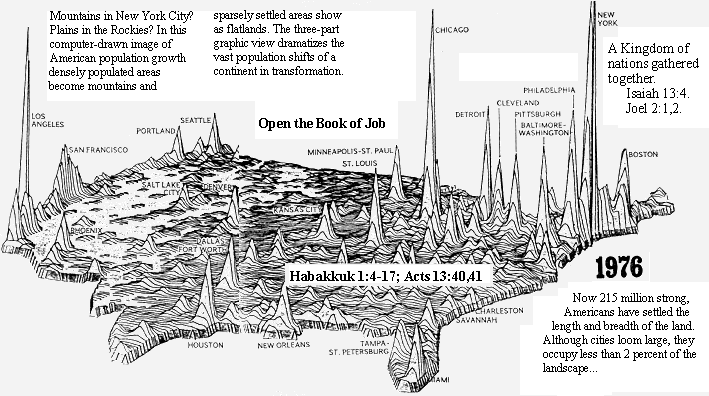
The American Imperium did not start there, it started in 1606...Genesis 15:12-16...(KJV).
...And the American imperium did not stop there. In 1903 Teddy Roosevelt engineered Panama's rebellion against Colombia. The next year he asserted the Roosevelt Corollary to the Monroe Doctrine. Washington not only had the right to keep European powers out of the Western Hemisphere, it also had the right to exercise "an international police power" against any country in the Americas engaged in "chronic wrongdoing." Over the next three decades, the Marines conducted long occupations of the Dominican Republic, Haiti and Nicaragua while fulfilling Roosevelt's charge to restore "the ties of civilized society."
THE UNITED STATES DID GO MARCHING HOME AGAIN AFTER WORLD WAR I. BUT IT DIDN'T AFTER WORLD WAR II. INSTEAD WASHINGTON BUILT A WEB OF PERMANENTLY ENTANGLING ALLIANCES THAT STRETCHED AROUND THE GLOBE. AT ONE POINT THE UNITED STATES HAD MILITARY BASES IN MORE THAN 70 COUNTRIES.
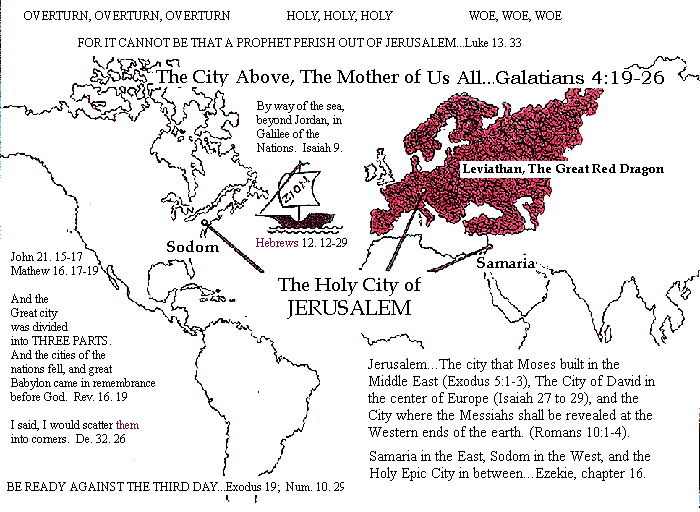
I have laid a snare for thee, and thou art taken, O Babylon (America), and thou wast not aware: thou art found, and also caught, because thou hast striven against the Lord...(Jeremiah 50:24; Revelation 18...KJV).
TODAY NO OTHER COUNTRY CAN BEGIN TO MATCH THE REACH AND LETHALITY OF THE AMERICAN ARMED FORCES. Only the United States can send bombers from its heartland on a round-trip mission to attack targets anywhere around the globe and do so with great stealth, precision and destructive force. Only the United States can quickly dispatch ground forces in large numbers to any battlefield in the world and defeat any traditional foe. Only the United States can deploy a truly blue-water navy across every ocean, with 12 mammoth aircraft carriers each housing a modern air armada larger than the entire air force of most countries.
There is no doubt that the United States can afford this vast military might. The American economy accounts for 31 percent of the world's total output, as much as it did in the 1950's. It is larger than that of the four next-largest national economies (Japan, Germany, France and Britain) combined, and it accounts for almost half the gross domestic product of the G-7 countries (which also include Canada and Italy). At the same time, military spending consumes a smaller share of the American gross domestic product today than it did a decade ago, and only about half of what it did during the height of the cold war. "Being No. 1 at great cost is one thing," the Yale University historian Paul Kennedy marvels. "BEING THE WORLD'S SINGLE SUPERPOWER on the cheap is astonishing."
The real debate, then, is not whether to have an empire, but what kind. Should America pursue a go-it-alone strategy as it did in 1910, when the United States exerted its power largely at the point of the bayonet and ignored the views of others? Or should it be the empire of 1950, when Washington embedded American power in multilateral institutions that reflected American interests but also constrained its freedom of action?
This question was the crux of the dispute with the United Nations over whether to invade Iraq and the one preoccupying the world now as the reconstruction begins. President Bush has made it clear since Sept. 11 that he intends to lead, and other countries can follow or get out of the way. HE AND HIS SUPPORTERS SAY THE UNITED STATES EMBODIES A UNIQUE BLEND OF MIGHT AND RIGHT THAT CAN DELIVER A WORLD OF PEACE AND PROSPERITY FOR ALL. To forsake that opportunity in a fit of self-doubt or excessive modesty, they say, will only make Americans and all other peoples less secure.
Critics, by contrast, favor an empire built on international cooperation, alliances and law. They argue that is the only way to reassure countries fearful of American dominance AND KEEP THEM FROM USING THEIR diplomatic and ECONOMIC POWER TO CONTAIN THE UNITED STATES.
As the Iraq war underscored, the United States' great power enables it to act alone and still achieve many of its goals swiftly and effectively. But over time such a unilateral exercise of power will breed more and more resentment abroad to the point that other states may decide to work together to obstruct the chosen American course. THEN, THE UNITED STATES COULD STAND ALONE, A GREAT POWER FRUSTRATED IN THE PURSUIT OF ITS MOST IMPORTANT GOALS.
AMERICA: AN EMPIRE TO RIVAL ROME
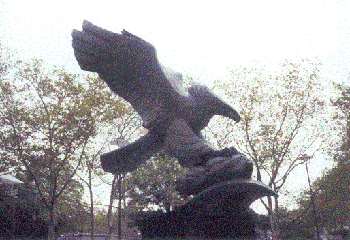
And their horsemen (their warriors) shall spread themselves...and shall come from afar; they shall fly as the Eagle that hasteth to eat...(Habakkuk, chapter 1; Acts 13:40,41...KJV)
In a new six-part series entitled Age of Empire, the BBC's Jonathan Marcus sets out on a journey to examine America's place in the modern world.
"America has no empire to extend or utopia to establish. We wish for others only what we wish for ourselves - safety from violence, the rewards of liberty, and the hope for a better life." So declared President George Bush in the traditional graduation address at the US Military academy at West Point in June 2002.
But despite his insistence that the US has no imperial ambitions, the word "empire" is increasingly used by academics and pundits alike when talking about America's role in the world. We thought long and hard about the title for this series. Would Age of Empire prejudge the issue? Is America really in any sense an empire like Ancient Rome or Victorian Britain? It is a question I put to virtually everyone I spoke to. The answers differed dramatically.
The young British historian Niall Ferguson, for example, had no doubts. "The United States," he said, "is an empire in every sense but one, and that one sense is that it doesn't recognise itself as such." He called it "an empire in denial."
Strobe Talbott, former Deputy Secretary of State in the Clinton administration, found the notion of the US as an empire "grotesque, bizarre or laughable, depending upon what mood I'm in and who says it". He said that, if anything, it was an anti-empire. "There is no interest among American people to set themselves up as an imperial power."
For others, like Michael Mandelbaum of the Johns Hopkins School for Advanced International Studies, America's current position is unique - there simply is not an adequate word to describe it. As he put it: "Empire is not quite right but it seems to be closer than anything else we have in common usage, so we employ it."
Empire or not, there is a growing feeling around the world that America's unrivalled power is in some sense a problem. It is something that Strobe Talbott recognises with regret. "When our friends around the world get together behind our backs, they talk about the problem of American power, how to cope with it, manage it, even how to contain it. "That is not the way we want others to think about us."
Globalisation meets 9/11...Today one of the buzz-words of international politics is globalisation. It too is not an easy term to define; it encompasses the spread of market capitalism and the new communications technologies. These seem to be shrinking the world and eliminating diversity. Many trace a foreign policy shift to the events of 11 September 2001
Globalisation and US dominance are inextricably bound up....The world of globalisation that was opened up by the collapse of the Soviet Union and the end of the Cold War seemed almost designed for the US, accelerating the emergence of American superpowerdom. For Joseph Nye, dean of the Kennedy School of Government at Harvard University, US dominance has been a fact for years. But it was the tragedy of 11 September which presented America's position in a stark new light.
Indeed, we began our series at Ground Zero in New York, the site of the Twin Towers of the World Trade Center. Many people believe that it was from the rubble of the towers that a more assertive and ideological foreign policy emerged. Afghanistan and Iraq were invaded. President Bush proclaimed a new doctrine of pre-emptive military action.
So how does the current position compare with the great empires of the past. Is America just the latest in a long line of dominant powers? Or is it really unique? Fareed Zakaria of Newsweek International, fast becoming one of America's most interesting foreign policy pundits, insists that there has never been anything quite like America's dominance of the world. There have been other great powers, like the British Empire, but none have towered over their rivals in the way the United States does.
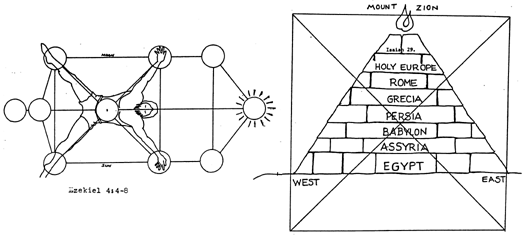
The United States of America...The Eighth Western Empire to hold the Oracles of God captive...(Revelation 17:9-18).
US defence spending dwarfs any of its rivals....American dominance is not just military; it is economic. US popular culture has spread around the globe. There is what Mr Zakaria terms "a comprehensive uni-polarity" that nobody has seen since Rome dominated the world. The Romans with their language, currency and the spread of Roman citizenship perhaps foreshadowed an early form of globalisation.
Niall Ferguson believes it is the British Empire that offers one of the best parallels. He argues that if you look at what the US has long tried to do - expand the global reach of free markets and ultimately representative government - it bears an uncanny resemblance to what he characterises as the project of Victorian Imperialism.
But there is another side to this whole debate. Joseph Nye of the Kennedy school of Government believes that all the talk of US dominance and influence obscures a much more fundamental reality. He calls it "THE PRADOX OF AMERICAN POWER", by which he means that for all its global might, the US is unable to get the outcomes it wants by acting alone. He argues that in terms of issues like countering transnational terrorism, dealing with the spread of infectious diseases, global climate change, international financial stability, none can be managed by any one country. The message for US policy-makers, he says, is simple. "We are the strongest nation the world has seen for some two millennia and yet we can't get what we want by acting alone".
The Age of Empire series is broadcast on Mondays at 09:05GMT on BBC World Service Radio.
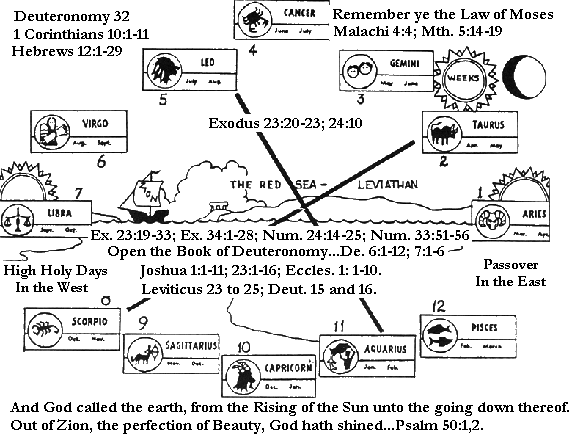
1 THESSALONIANS 5; 2 THESSALONIANS 2; REVELATION 18.
(ISAIAH, CHAPTERS 13 AND 14).